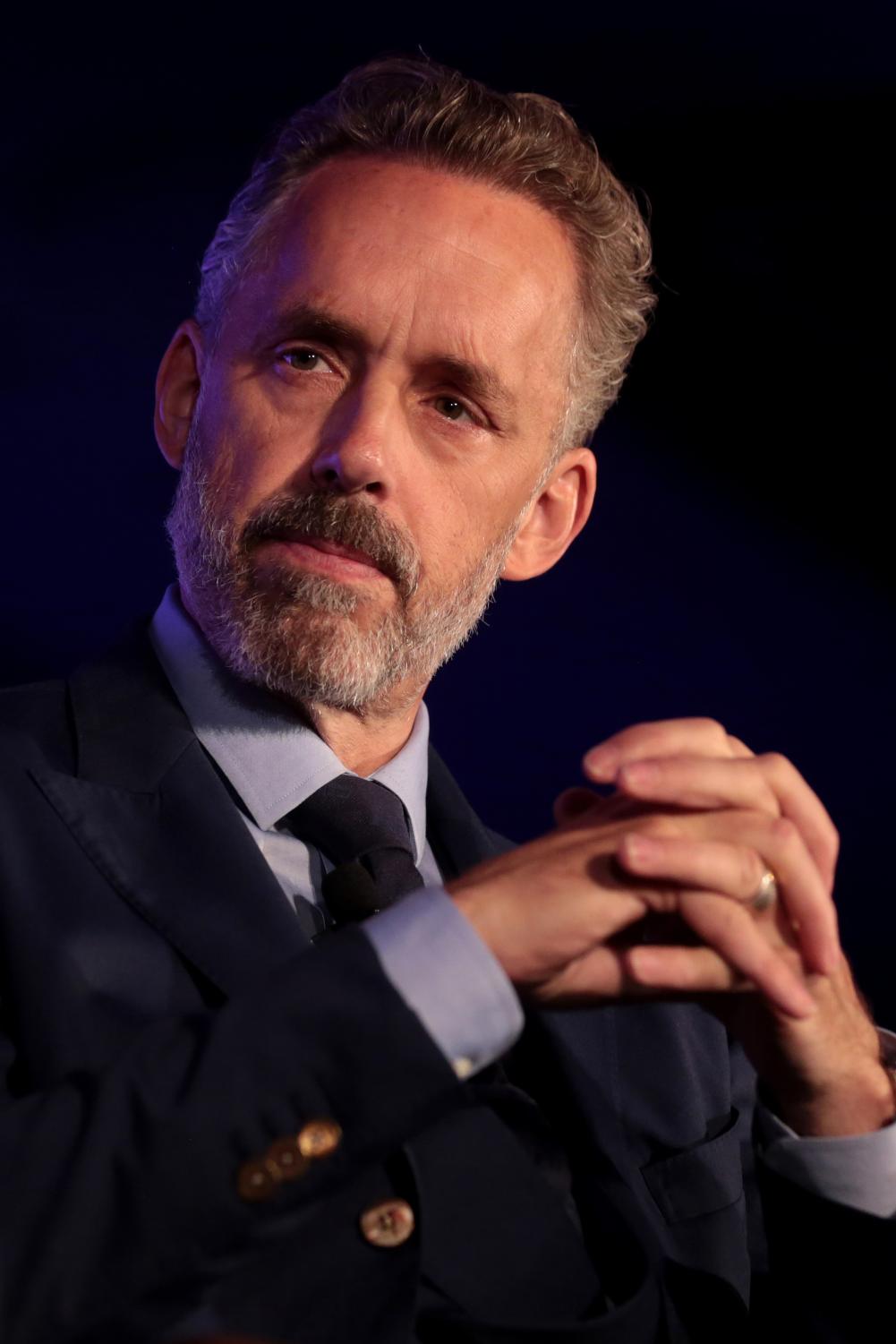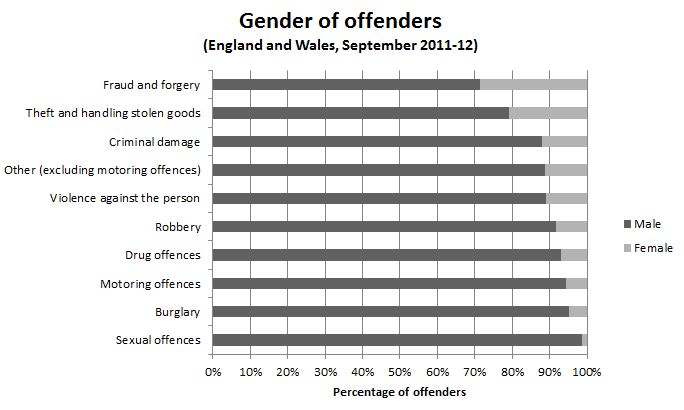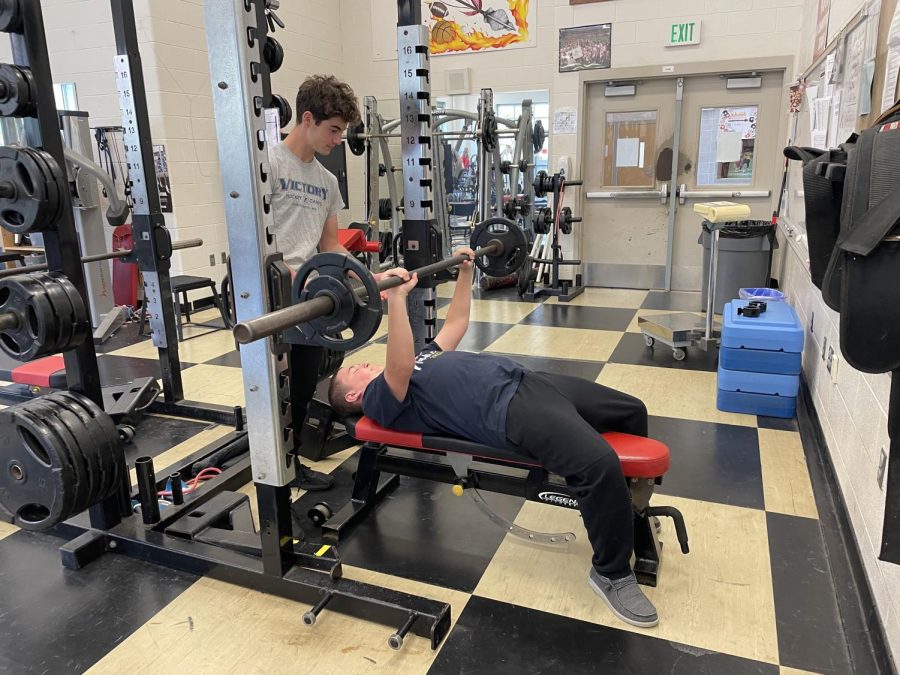The war for masculinity: The Jordan Peterson drama
Freshmen Declan Lockwood and Ben Teslenko build their strength through weightlifting.
October 31, 2022
Since the beginning of history, men have been defined by their masculinity. Stoicism, willpower, strength and other similar qualities have been socially identified as what a man should be or possess.
In modern times, movements supporting the rights of women across the world have turned masculinity into a topic of constant debate. Many people have even decided that they believe the idea is entirely misogynistic in itself.
On the internet, the phenomenon known as cancel culture is the idea that when a person is deemed morally imperfect by the vast council of anonymous social media users, they then have the right to dethrone that person, not only from popularity but their own success and careers.

This may be acceptable for those who have committed heinous criminal acts, but it has spread beyond that. Those who debate hot topics, including masculinity, must now be extremely careful with their own opinions or risk being canceled.
This is why 38-year-old actress Olivia Wilde, who is likely motivated by potential for an increase in social media buzz, decided to publicly comment on another influential public figure, Jordan Peterson.
In an interview with “Interview Magazine,” Wilde stated that the sinister antagonist of her latest film “Don’t Worry Darling” was inspired by Peterson himself, who she had no public connection with in the past.
“’We based that character on this insane man, Jordan Peterson, who is this pseudo-intellectual hero to the incel community,’” said Wilde.

Peterson is a 60-year-old clinical psychologist who has received widespread attention for his views on social and political issues, many of which follow a more conservative angle.
His views surrounding masculinity are his most popular, and this popularity has only grown in connection with a recent spike in the popularity of pro-masculine, often misogynistic influencers like Andrew Tate.
Part of Wilde’s remark references the incel community, a group of men named after the term involuntary celibate, who have garnered attention on the internet for being misogynistic and believing themselves to be deserving of women’s attention just by existing. Though Peterson himself claims no alignment with this group, some of his claims can easily be aligned to support their views.
For example, Peterson often discusses how he believes that men are being underappreciated in society as compared to their disproportionate participation in extremely dangerous, strenuous occupations and devotion to keeping public services operational. For instance, 97.1% of brick layers, a considerably strenuous occupation, are men.
Incel communities have reinterpreted these claims as more evidence to prove why they are owed respect and sexual gratification from women, which was never Peterson’s intended message.
“‘People have been after me for a long time because I’ve been speaking to disaffected young men … what a terrible thing to do, that is,’” Peterson said saracastically in response to Wilde’s comments.
While he does not support their cause, Peterson showed that he felt empathy for incels, for their pain, loneliness and the inconsiderate hatred they receive.
These debates about masculinity are not limited to online communities; it is becoming an increasingly prominent issue among teenagers and young adults.
“I have to remind myself that I am a whole person, and I can act however I would like … even if others are not the biggest fan of it,” said Northern Burlington High School senior Atalia Romano.
Having not only men but also women be restricted to specific stereotyped traits can make it harder to explore what makes one feel most comfortable as a person.
Those who are considered masculine men also tend to be more dominant and aggressive, which is typically unnecessary and can be demeaning to others.
“No one, regardless of gender, should be aggressive or violent,” said Romano.

This aggression can also be dangerous and provoke men to think they can take advantage of the women who they feel are below them.
“I have been around men who think they are above me or know more than me because they are men and I am a woman,” said Romano.
Issues like this are prime reasons why many people feel as if the concept of masculinity is unnecessary in this day and age. To them, it feels as if masculinity does far more harm to society than good.
“It really has no purpose anymore … we are in the modern world where women are no longer the caretakers and the men aren’t just the breadwinners,” said Romano in her final statement.
However, this opinion is challenged by men who have experienced the more personal effects of masculinity. Many male students find it to be a helpful mindset under most circumstances.
“[The concept of] masculinity has affected my life greatly. It is the ability to be there for my family and friends, even when I am having a hard time. It provides me the ability to live up to the expectations they want me to live up to, no matter how difficult. It is an unfailing mental crutch,” said Franklin High sophomore Jackson Hetrick.
Masculinity can be a useful tool to make it through a lot of the issues that plague the younger generation. Depression, anxiety, and other mental illnesses can be largely overcome through perseverance and willpower. In its purest form, these are two of masculinity’s core principles.
“Emotions are important … being able to, well, ‘turn them off’ for short periods of time is still a useful trait often associated with masculinity,” said Hetrick.
He also recognizes that if used incorrectly, persevering through issues like the aforementioned may only make the issue worse. Hetrick noted a relevant personal example to support this view.
“But still, emotions are important, and sometimes I find myself holding them in too much. I have to be careful about that, I guess … [For instance,] I don’t think I’ve ever cried at a funeral,” said Hetrick.
Although Hetrick thinks perseverance and willpower should remain prevailing traits, they need not be only associated with men.
“I believe anyone can be what they want, but I still think that the term [masculine] is a good way to describe someone in 2022 if they align with the right traits. Anyone can be masculine; it is a useful mindset,” said Hetrick.
Despite their different opinions, both students agreed on the topic of incels and those with similar mindsets.
Regarding incels, Hetrick said, “People adopt the mindset through the people around them and through their own insecurities. It’s similar to racist people learning to be better; it’s fixable.”
Hetrick feels as if most people that make the jump from pro-masculinity to misogyny pick up those traits from their parents or life experiences. It is not an inherent part of a masculine mindset, so it can be fixed.
“People adopt this mindset because they don’t get a lot of female attention … [why] adopt this mindset when they could reflect on themselves and see why women reject them instead of hating? … [This] only digs them deeper into that mindset,” said Romano.
Romano acknowledged that most people who end up with these mindsets do so in response to feelings of insecurity or being rejected. She believes self-reflection and self-improvement are the only way to escape said mindset.
Concluding her thoughts on misogny, Romano said, “I think any wound can be healed with time and patience. It’s also normal for mindsets to change as we grow as people; it’s a part of being human and learning how to navigate through life.”
Even with differing opinions, certain aspects of both student’s perspectives align with the root of Peterson’s argument.
“’Women, like, be picky. That’s your gift, man. Demand high standards from your man. Fair enough. But all these men who are alienated, it’s like they’re lonesome, and they don’t know what to do and everyone piles abuse on them,’” said Peterson.
Pain, in any form, can be a never-ending cycle. People often hurt others because they were hurt themselves or were taught to hurt. They may not know how to recover from their experiences or learn to break the cycle.
The same remains true for men. Hating them for their mindsets will only drive them deeper into toxic masculinity and misogyny.
As a society, parents, siblings, friends and partners are most often the ones responsible for pushing those with these negative mindsets in the wrong direction, rather than supporting them in capitalizing on the possible benefits of masculine traits.
So, aren’t they owed the right to rehabilitation as well?
“’I thought the marginalized were supposed to have a voice?’” said Peterson, as tears welled up in his eyes.
Masculinity has been a useful tool for many throughout history. That is undeniable. And while its modern prevalence will continue to be debated with no exact answer, masculinity in its most problematic and horrid form will never be eliminated through debate.
The issue with toxic masculinity will only be solved by a change to one’s views and a willingness to educate.
Hatred, villainization and cancel culture may make it easy to view the world in black and white, but everyone deserves help, no matter how far they have fallen. It is only when given that help that they may rise again.






